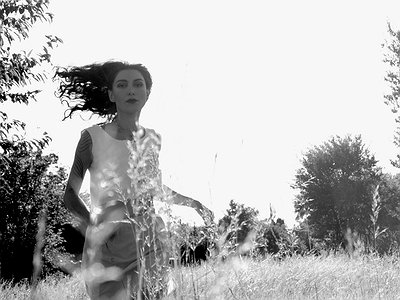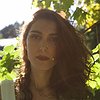Part 1
Name: Soho Rezanejad
Nationality: Danish
Occupation: Artist, composer and playwright
Current Release: Perform and Surrender on Silicone Records
Recommendation: I'm going to make this one easy and share an article I read this morning, an essay Writers and the War Against Nature by Gary Snyder.
To find out more about Soho's work, visit her website www.sohorezanejad.com or Facebook page.
When did you start writing/producing music - and what or who were your early passions and influences? What is it about music and sound that drew you to it?
Singing was from an early age the way I identified with the world. Had my parents stayed in Iran, it might have been different. I grew up learning multiple languages and hesitated to speak any of them until I was about five. Around that age, I remember obsessively playing with the idea of being mute. I even went through a slight religious phase, insisting that all the adults call me Ariel, the Disney character in Little Mermaid. I thought, maybe if an adult would buy into it, then perhaps it would be true. That realm of fantasy led to songs, especially non-verbal melodies. All of that played a great role in the way I communicate.
For most artists, originality is first preceded by a phase of learning and, often, emulating others. How would you describe your development as an artist and the transition towards your voice? What is the relationship between copying, learning, and creativity?
It's a good question because deep down, I want to be just that. If it only existed, Some hundred years ago, we took pride in representing ourselves for past works, and now it seems we disconnect from that collective credibility to stand out as our own. As much as I try to simplify its meaning, I'd like to believe that originality, in and out of its paradoxes, is not a matter of being it per se. Instead, it's about being receptive to revelations, adapting to different practices so that the combination might strike something in someone. And that someone may trace it into something new and impress it onto somebody else. Being original is too individualistic of an approach, but I would be happy believing I can be that for somebody! I think it's more of a phenomenon than the reputation of a person. So much of literature and the relative arts stem from these brief prophecies that we receive and transmit. We do it all the time. The best thing I can do in that department is to interpret the things that move me and be honest with how they come out.
What were your main compositional and production challenges in the beginning, and how have they changed over time?
I can't think of any technical challenges that have stayed long enough to address. Generally, I have always done what I needed to do, realising something anchored in that made people nervous. I don't want to apply that to my gender because there may be other reasons for it, but I can imagine that every woman faces a similar consequence, doing what pleases her. It does provoke people. Asserting herself in what she enjoys doing and then practicing it every day like a religion, without that father of a figure peering down at her. Sometimes, at the price of eras of betrayal, we can become quite militant, because it replicates a world we have submitted to for so long and perhaps to simulate it will make us feel safer in it. So, we do become like leather sometimes, especially in the work field. Even by something as small as being identified as women composers, women directors, women writers, "strong women" like it's some kind of revelation, it turned out that way! It would be great if we left the first part out and let the work speak for itself.
What was your first studio like? How and for what reasons has your set-up evolved over the years and what are currently some of the most important pieces of gear for you?
My first studio was in a warehouse in Copenhagen out by the water. I lived there for half a decade and gave everything away when I moved out. As of now, I don't own much other than a few essentials like a microphone and tablet. I'm more drawn to visiting studios, seeing how people work, and working with some, by chance.
Collaborations can take on many forms. What role do they play in your approach, and what are your preferred ways of engaging with other creatives through, for example, file sharing, jamming, or just talking about ideas?
All directions work as long as there is mutual admiration. It's natural to share ideas, but there comes a time to press reset and see what stays out of that conversation by trying out different things without judging the process. There is value in not assessing the work while it’s still new and tender, it’s part of being vulnerable. Something helpful is to put it aside and come back with editor's ears, so that the roles are split. The first stage stays open and resourceful, and the following sessions more certain and narrative focused. It, of course, also becomes easy when you work with people you respect! When I get that lucky, I forget the ego and simply trust that we are going to the same place. I get really excited working with someone who looks for the same things without discussing it because it means we can be intuitive together. It's sort of like meeting an old friend who lives on the other side of town and realising you're about to take the same train.
How do you make use of technology? In terms of the feedback mechanism between technology and creativity, what do humans excel at, what do machines excel at?
It excels at the length of how we respond to it. Suppose we see technology for what it is, a manifestation of the human mind, making any thought come alive; the place where we succeed is where and how we position machines ethically. But to the advantage of humans? At least it needs more of a motive before I can find that reassuring. Maybe, when it cleans air and water, protects animals, obeys people's rights, and performs our labour. Saving time to do what we love doing, learn more about ourselves, and tend to our loved ones. Technology will only thrive with courtesy to nature. We can only excel at the length of preserving nature instead of having a war on it.
Production tools, from instruments to complex software environments, contribute to the compositional process. How does this manifest itself in your work? Can you describe the co- authorship between yourself and your tools?
I don't judge based on its interface as long as it does the work. I have to be sure that I can keep up with whatever I'm using when the ideas come through. Melodic compositions come naturally; they happen very quickly, so my agency is to do it without much thought or hesitance. Sometimes, the best way to follow through with an idea is to work with someone who can assist the parts that would otherwise deplete the imagination. For periods where I'm receiving a lot of creative information and want to get it out reasonably, I invite someone close to the project who trusts the craft and wants to support the vision. It makes things fair on myself.
Could you take us through a day in your life, from a possible morning routine through to your work? Do you have a fixed schedule? How do music and other aspects of your life feed back into each other - do you separate them or instead try to make them blend seamlessly?
Routine is important, but sometimes it gets trivial, so I switch things up. Some days start already at 5 in the morning, and some won't start until I find a reason. A friend calls this my monk phase clashing with my boyhood, which is very on point.
Life and work have always been synonymous, and I think it will stay that way with age. I want to be better at separating the two, but it’s so embedded in me that I am still figuring out how. I try to keep things simple, one step at a time: that way it's more productive. It’s boring if I get into what I do, but we all know that it's a lot of work to meet one's creative standards. It's a constant re-evaluation of self-one’s role in the world.






